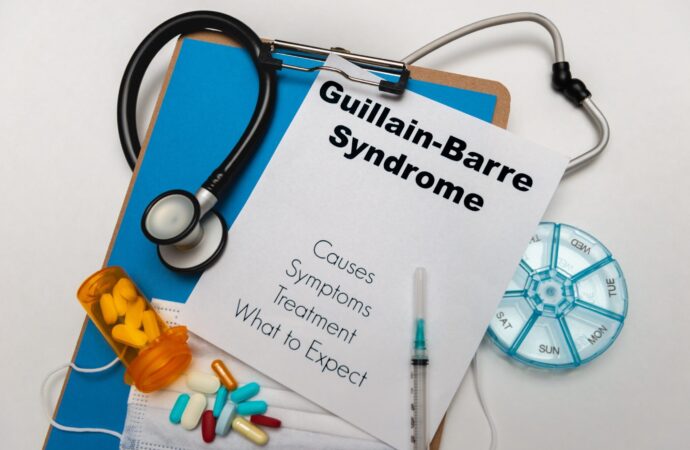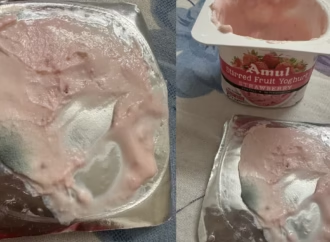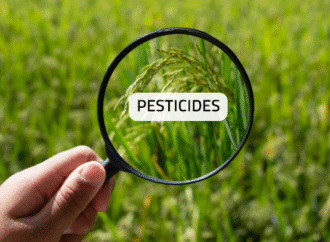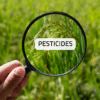Author: Dr. Marita Thomas
Since 2020, media headlines in India have featured various health crises, including COVID-19, Dengue fever, the Nipah virus, and the Chandipura virus, to name a few. The latest to make headlines is Guillain-Barré Syndrome (GBS). In Pune, as of January 2025, over 100 people have been diagnosed, with one death reported.
Although it may seem like a new disease, GBS was first described in 1859 and officially named in 1916. Since mid-January of this year, multiple suspected cases have been reported in different parts of India. In such circumstances, it is crucial to arm ourselves with information about the disease and how to prevent it.
What is Guillain-Barré Syndrome?
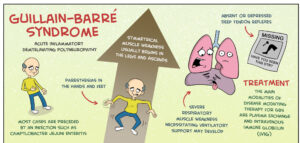
In simple terms, GBS is a collection of symptoms caused by inflammation in multiple nerves, leading to muscle weakness and affecting reflexes. In medical terms, it is an inflammatory polyradiculoneuropathy due to the demyelination of nerves.
What Causes GBS?
Our immune system is a wonderful system that reacts to anything it deems a threat, protecting us and keeping us safe. However, it is not always very smart. Infections can sometimes trigger an immune reaction, causing the body to attack not just the threat, but itself as well. In GBS, these protective complexes attack the nervous system, resulting in symptoms.
The most common organism associated with GBS is Campylobacter Jejuni, a bacterium that is a common cause of food poisoning. It spreads from contaminated objects to humans, such as undercooked food, contaminated water, animals, or animal faeces.
Other causes of GBS include respiratory illnesses caused by:
- Cytomegalovirus
- Epstein-Barr virus
- Mycoplasma pneumonia
- SARS-CoV-2 (COVID-19)
Symptoms of GBS
There are different variants of GBS. The most common type produces symptoms that typically follow this pattern:
- Onset (1-4 Weeks)
- Usually follows a gastrointestinal or respiratory illness.
- Mild tingling or weakness in the legs.
- Difficulty standing or wearing slippers.
- Progression of Symptoms (Days to 4 Weeks)
- Weakness spreads to the hands, making gripping objects difficult.
- Difficulty with walking, climbing stairs, or everyday tasks.
- In severe cases, loss of movement or complete paralysis.
- Peak Weakness (2 to 4 Weeks After Onset)
- Severe muscle weakness or paralysis.
- If respiratory muscles are affected, breathing difficulties (ventilator may be needed).
- Facial muscle weakness, affecting expressions and eye movement.
- Difficulty swallowing or speaking in severe cases.
- Recovery Phase (Weeks to Months)
- Recovery starts from the upper body and moves downward.
- Some recover quickly, while others take months to a year.
- Most regain full function, but some experience lingering fatigue or weakness.
Treatment of GBS
Early recognition and medical intervention are crucial in treating GBS. Hospitalization and supportive care are necessary.
The treatment mainly focuses on:
- Reducing and managing inflammation.
- Inhibiting disease progression.
A targeted approach involves :
- Plasma exchange (plasmapheresis) and intravenous immunoglobulin (IVIG) reduce immune system attacks.
- Physical therapy and supportive care to aid recovery.
- ICU care and ventilatory support if breathing muscles are affected.
Most patients start improving within weeks, but full recovery can take six months to a year. In rare cases, some may experience lingering weakness or fatigue.
Preventing GBS
While GBS cannot always be prevented, reducing the risk of infections that may trigger the condition is key. Simple precautions in daily life can help safeguard your health.
Practice Food Safety
- Wash all produce thoroughly.
- Cook poultry and meats thoroughly to kill bacteria like Campylobacter Jejuni.
- Avoid cross-contamination between raw and cooked foods.
- Always wash hands, cutting boards, and utensils after handling raw meat.
- Drink clean, treated water.
Prevent Viral Infections
- Get vaccinated against the flu and COVID-19, both linked to GBS.
- Practice good hygiene like frequent handwashing to reduce infections.
Seek Early Treatment
- Address respiratory and gastrointestinal infections promptly to minimize immune complications.
Key Points
- GBS is a rare but serious neurological disorder triggered by infections.
- Early symptoms include tingling, weakness, and difficulty walking, which can progress to paralysis.
- Early treatment is crucial to prevent complications.
- Most people recover, but some may experience long-term weakness.
- Food safety, hygiene, and vaccinations can help reduce the risk of GBS.
Awareness and early intervention can improve outcomes for those affected by GBS. If you or someone you know experiences sudden muscle weakness, seek medical attention immediately.
 Food Manifest
Food Manifest 